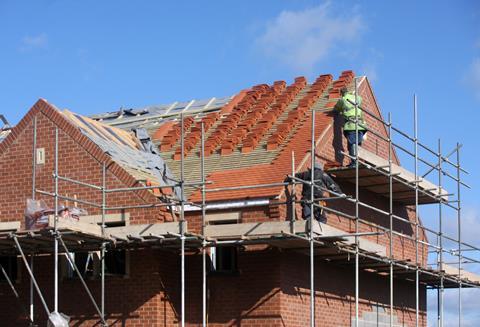Fastest rise in housebuilding activity offsets declines in commercial and infrastructure work, says IHS Markit/CIPS

Last month’s hike housebuilding was the fastest so far in 2019 and helped drive up overall construction output for the first time this year.
According to the latest IHS Markit/CIPS construction survey, output increased for the first time in April despite a dip in activity in both the commercial and civil engineering sectors.
The IHS Markit/CIPS UK Construction total activity index posted above the neutral 50.0 threshold for the first time since January, sitting at 50.5 in April, up from 49.7 in March.
Duncan Brock of the CIPS said the rise in residential activity was the only saviour for a sector that was otherwise heading for contraction again this month.
The new report suggested the Brexit stalemate was causing business optimism to be at its worst for six years, Brock added.
Mark Robinson, Scape Group chief executive, said while he was pleased with the construction output increase, it was obvious that “the residential sector is propping up an otherwise stagnant market”.
He said: “At the same time we must make sure that the pace at which we are building new houses is not impacting on the quality of those homes. Consumer confidence in the housing sector has been knocked while the industry strives to meet government targets.”
According to the report, several firms linked lower commercial construction to Brexit-related uncertainty and delays with client spending decisions, while some firms commented on a lack of new work to replace completed infrastructure projects.
Robinson said: “Dragged-out Brexit negotiations have so far have been abysmal, and right now further uncertainty is the only thing that the construction industry can count on. Clearly this is impacting both new orders and long-term business optimism.”
Blane Perrotton, managing director of the national property consultancy and surveyors Naismiths, was similarly sceptical: “While this slight uptick appears tantalisingly close to being a cause for celebration for the UK construction sector, nothing could be further from the truth.
“With no tangible end in sight to the farce that is the UK’s effort to leave the bloc, commercial developers are understandably more inclined to continue sitting on their hands rather than commit to larger projects that carry more risk.”
Perrotton said stimulus from Help to Buy, low interest rates and a strong jobs market had seen housebuilding carry the industry through a tumultuous April. “But even here new orders have plunged to worrying depths and are now at their lowest since March last year,” he added.
The latest update came on the same day as RICS’ latest UK Construction & Infrastructure Market Survey, which found private housing workloads were comfortably in positive territory, with a net balance of +21% of survey respondents reporting a rise in activity, up from +20% in the last three months of 2018.
Covering the first three months of this year, the report found overall confidence in the sector had fallen almost to a six-year low, while access to capital was being squeezed.










No comments yet